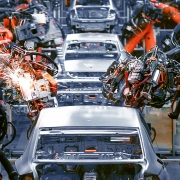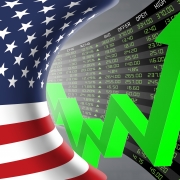In Economics, What Matters Is The Level Of Production. Everything Else Is Secondary.
Economics is truly a 3rd grade subject, and it would be more broadly viewed as a 3rd grade subject if people broke it down to the individual. Looked at through the prism of the individual, the easy answer for economic growth is always to remove or reduce the tax, regulatory, monetary and tariff barriers that invariably harm individuals.
No doubt there are groups of people who might benefit from taxes, regulations, currency devaluations and import taxes (tariffs) foisted on others, and no doubt there are countless individuals who thrive economically despite heavy taxes, regulations, devalued money and tariffs, but no individual benefits economically if more of his work is penalized, more of his time at work is spent complying with regulations, if the money earned at work is routinely being devalued by the government issuer, and if the imports he truly desires come with a tax.
Broken down to the individual we also know that our capacity to buy what we want is a consequence of our capacity to produce. Who knows when we figure it out, but it doesn’t take a high school, college or post-grad education to alert people to the direct correlation between production and demand. We buy things after we produce, so if we want to have life’s finer things, we must produce.
That’s why it’s always so comical to read about economists obsessing over “demand.” It seems economists know the 3rd grade subject that is economics the least well, and this is probably true because they sought higher education to learn what is so basic.
Why would anyone of sound mind focus on demand when the latter is always and everywhere what’s expressed after supply? There’s no getting around this truth. Underlying all demand for goods and services is production of goods and services, at which point the path to rising demand is a reduction of the barriers that limit supply. Nothing could be simpler.
What about money? Money is just the agreement about value among producers that facilitates the exchange of products for products. Long before state-minted money, producers sought a way to exchange with other producers, and “money” was created by those producers as a common language of sorts enabling exchange. If everyone agreed a seashell, a cigarette or 1/35th of a gold ounce had a market value, then these forms of money would facilitate exchange of products among producers with disparate wants: I have bread and I desperately want to exchange it for your wine, but you only want the butcher’s meat. Money makes it possible for me to get your wine at which point you’ll take my money and buy the butcher’s meat.
Which brings us to debt. Look around the internet in search of financial and economic commentary. If you do, you’ll invariably find all manner of alarmist commentary about “soaring debt,” “debt bubbles” whatever that could mean, and one seen by yours truly the other day about how “The World Is Drowning In Debt.” Such a view misses the basic truth that with all things financial, underlying them is an exchange of products.
With debt, there’s merely an exchange of existing production for future production. Getting right to the point, the world is drowning in debt because it’s “drowning” in production. People borrow money not to look at it, but because it can be exchanged for real products and services. If debt is soaring, then so by definition is production.
Soaring debt isn’t a flashing red sign of economic carnage as much as it’s the logical result of the exact opposite. When individuals are producing more, there’s logically quite a bit more to borrow.
Crucial here is that borrowing is similarly an exchange of products. In the present the lender has money exchangeable for goods and services, and the lender is willing to pass up accessing those goods and services now in order to get more goods and services in the future; the difference being the cost of borrowing tacked onto the loan (rate of interest) that the lender adds on. Of course the lender doesn’t want to get less in the future, which means the lender seeks a producer seen as a good when it comes to paying the monies borrowed back. Lenders aren’t predators on the weak as financial journalists naively assert, and they aren’t because they once again want to get more goods and services in the future then they’re transferring to the borrower in the here and now. Borrowers are seen as good to pay back their debt precisely because the work they do is seen as worthy of generating the income that will pay the monies borrowed back.
But wait, some will say, governments borrow excessively. Yes they do, and they’re able to do so because their borrowing is backed by the productive people they’re empowered to tax. Governments produce nothing. That’s why it’s so comical when economists claim government borrowing and spending stimulates economic growth. Economists remind us how silly it is to seek a credential in something so 3rd grade. Governments can stimulate nothing. The debt they run up is a consequence of economic growth, not a driver of it. The more that the citizens they tax are producing goods and services exchangeable for goods and services, the more that governments can tax their production. Governments don’t stimulate growth as much as they tax and borrow it, only to mis-allocate it.
Which brings us back to the individual. Individuals produce, and often times those producers delay the consumption of their production with an eye on transferring it to others. This is where debt comes in. It’s a happy result of soaring production, and expected future production that creates willingness on the part of the producer to delay consumption. In short, debt is a consequence of savings, which never harm the individual, and by definition never harm the economy. The alarmists all around us can relax.
John Tamny is editor of RealClearMarkets, Director of the Center for Economic Freedom at FreedomWorks.













